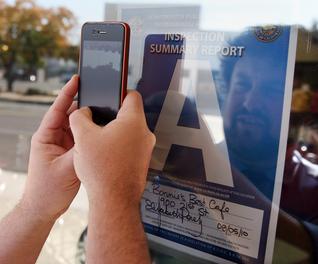In 1996, California strawberry growers were wrongly fingered as the source of a cyclospora outbreak that sickened over 1,000 people across North America; the culprit was Guatemalan raspberries.
After losing $15-20 million in reduced strawberry sales, the California strawberry growers decided the best way to minimize the effects of an outbreak – real or alleged – was to make sure all their growers knew some food safety basics and there was some verification mechanism. The next time .jpg) someone said, “I got sick and it was your strawberries,” the growers could at least say, “We don’t think it was us, and here’s everything we do to produce the safest product we can.”
someone said, “I got sick and it was your strawberries,” the growers could at least say, “We don’t think it was us, and here’s everything we do to produce the safest product we can.”
In Sept. 2006, an outbreak of E. coli O157:H7 killed four and sickened at least 200 across the U.S. This was documented outbreak 29 linked to leafy greens, but apparently the tipping point for growers to finally get religion about commodity-wide food safety, following the way of their farmer friends in California, 10 years later.
In 2011, Jensen Farms, an eastern Colorado cantaloupe grower produced melons that killed 32 and sickened at least 146 with listeria in 28 states. One grower trashed the reputation of the revered Rocky Ford Melon: plantings this year are expected to be down 75 per cent.
Now the Rocky Ford Growers Association has turned to government-delivered food safety audits rather than third-party audits, and committed to emboss a QR code on every melon it slates for retail sale. This QR code will tell consumers where the melon was grown, harvested, and prepared.
Location doesn’t mean safety. Include the production details.
In Aug. 2011, Oregon health officials confirmed that deer droppings caused an E. coli O157:H7 outbreak traced to strawberries, many sold at roadsides, that sickened 14 people and killed one.
So when NPR asks, Are local salad greens safer than packaged salad greens, it’s the wrong question.
It’s not whether large is safer than local, conventional safer than organic: it’s about the poop, and what any grower is doing to manage the poop. Or risks.
Any farm, processor, retailer or restaurant can be held accountable for food production – and increasingly so with smartphones, facebook and new toys down the road. Whether it’s a real or imaginary outbreak of foodborne illness, consumers will rightly react based on the information available.
Rather than adopt a defensive tone, any food provider should proudly proclaim – brag – about everything they do to enhance food safety. Explanations after the discovery of some mystery .jpg) ingredient, some nasty sanitation, sorta suck.
ingredient, some nasty sanitation, sorta suck.
Microbial food safety should be marketed at retail so consumers actually have a choice and hold producers and processors – conventional, organic or otherwise – to a standard of honesty. Be honest with consumers and disclose what’s in any food; if restaurant inspection results can be displayed on a placard via a QR code read by smartphones when someone goes out for a meal, why not at the grocery store? Or the school lunch? For any food, link to web sites detailing how the food was produced, processed and safely handled. Manage the poop, manage the risk, brag about the brand.

 This is nothing new.
This is nothing new..jpeg) that some of its grocery industry customers have eliminated finely textured beef.
that some of its grocery industry customers have eliminated finely textured beef..jpg)
 giving diners the power to access detailed inspection reports of food businesses through their mobile phones and other data devices.
giving diners the power to access detailed inspection reports of food businesses through their mobile phones and other data devices.